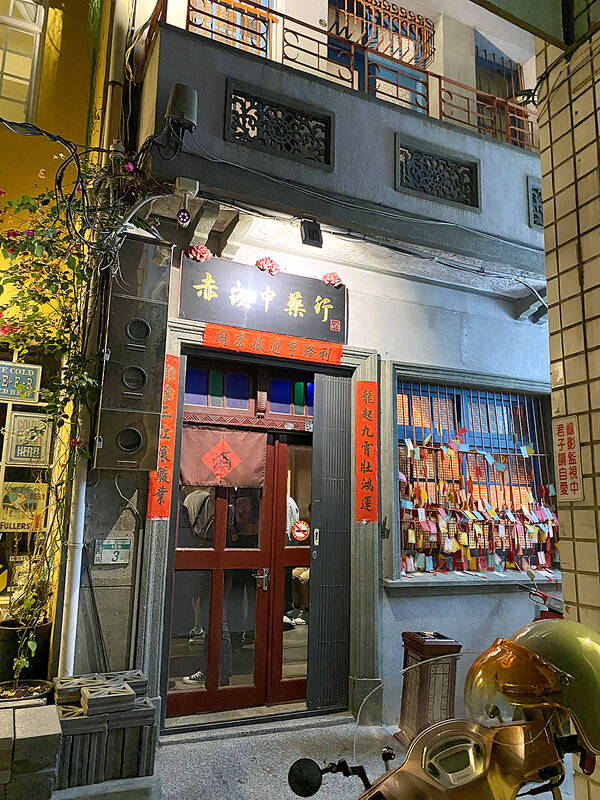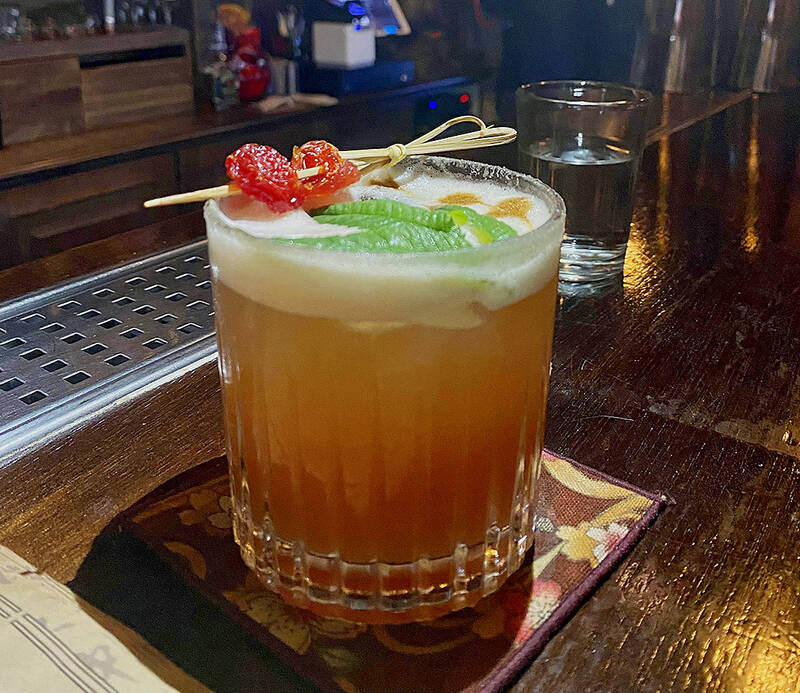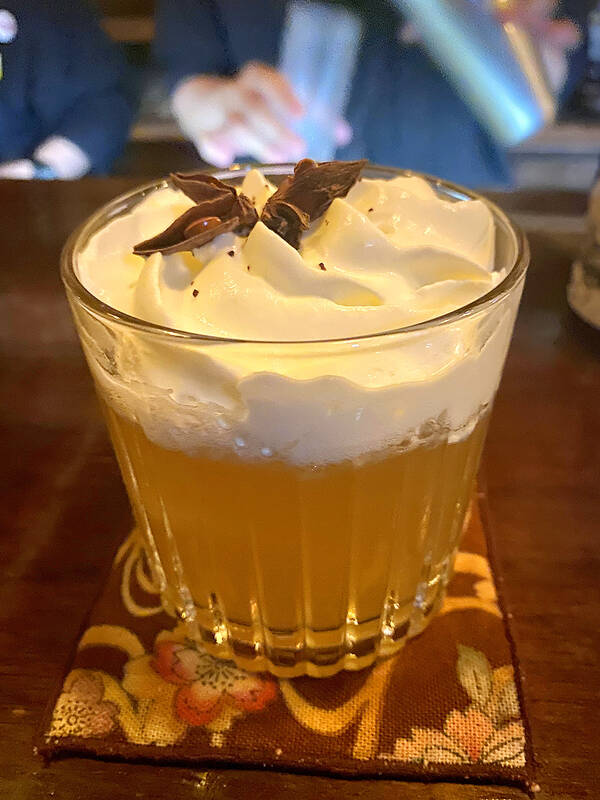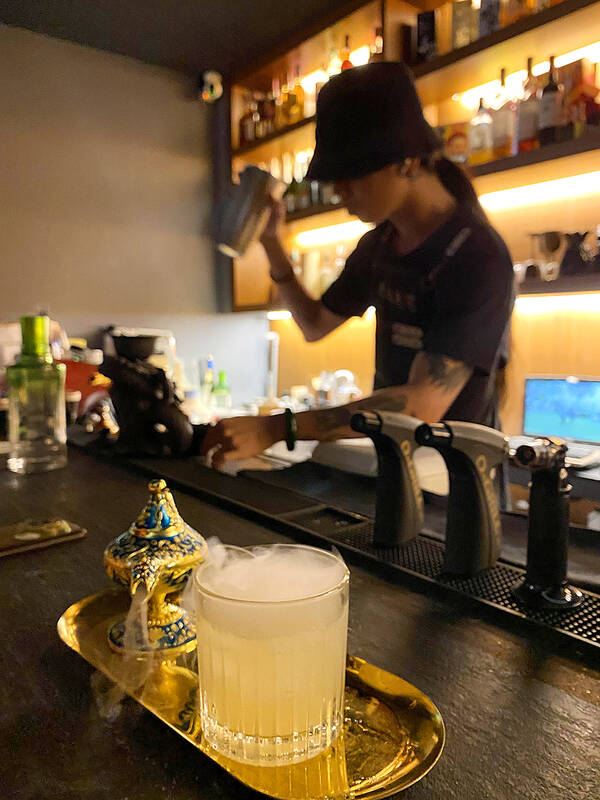When picturing Tainan, what typically comes to mind is charming alleyways, Japanese architecture and world-class cuisine. But look beyond the fray, through stained glass windows and sliding bookcases, and there exists a thriving speakeasy subculture, where innovative mixologists ply their trade, serving exquisite concoctions and unique flavor profiles to rival any city in Taiwan.
Speakeasies hail from the prohibition era of 1920s America. When alcohol was outlawed, people took their business to hidden establishments; requiring patrons to use hushed tones — speak easy — to conceal their illegal activities.
Nowadays legal, speakeasy bars are simply hidden bars, often found behind bookcases or secret doors that retain that old-school cool, bluesy jazz vibes of the roaring 20s. Consider the modern speakeasy as a game of hide-and-seek, an “insider secret” that needs to be discovered. Expect to pay a little extra for premium ingredients and service but the experience drinking in a clandestine waterhole is worth a few extra dollars.

Photo courtesy of Hollie Younger
CRAWLING TAINAN
Hordes of tourists pouring into Chikan Temple every day remain unawares that just opposite, tucked down a conspicuous side alley, lies Chikan Pharmacy (赤崁中藥行).
Opened in 2020, its owner took inspiration from the speakeasies of New York and Hong Kong and added a Taiwanese twist, showcasing the lost art of Traditional Chinese Medicine. Their cocktail menu leans towards the medicinal, herbal and even slightly bitter, with a strong focus on gin.

Photo courtesy of Hollie Younger Warning: Excessive consumption of alcohol can damage your health.
On the sweeter side, we recommend Straw (NT$400) a complex blend of gin, tea and spices topped with whipped cream, or test your palette with The Jerry Springer Show (NT$400). The combination of curry spices, rum and Earl Grey packs a punch as strong as its namesake’s TV guests. This venue is jam-packed until the early hours, so reservations are recommended in advance.
Once our appetite is sufficiently wet, we head to our second location, Speakeasy Bar (民生大戲院), arguably the best of Tainan’s speakeasies. Fantastic drinks, Instagram-worthy presentations and a quirky, classically speakeasy entrance. If you visit just one bar, make it this one. The facade looks like an old-school movie theatre, with billboards and posters. We approach and, seeing no other entrances, push the elevator button. Steeping out to check which floor we’re heading to we find the opposite panel of the elevator slides away to reveal the low lighting of a lively cocktail bar. Bingo!
A vintage cinema theme is retained throughout, with a cult film classics playing via a projector at the back of the bar. The has no menu so there can be no recommendations: staff will simply ask if you prefer sweet, sour, bitter — or, you can point to one of the fanciful creations being enjoyed by your fellow patrons with a casual “I’ll take what they’re having.”

Photos courtesy of Hollie Younger Warning: Excessive consumption of alcohol can damage your health.
Genie lamps, ornate vases, hip flasks hidden in bibles — the experience is reminiscent of an antique store that ran out of glasses. Smoke cascades from the nostrils of the black clay dragon which dispenses a cocktail into the awaiting teapot below. Everything bubbles and steams; these guys love dry ice and they’re not afraid to use it.
Expect to pay around NT$400 per cocktail.
GREAT NIGHTCAP

Photo courtesy of Hollie Younger Warning: Excessive consumption of alcohol can damage your health.
To wrap up the night, we head to our final and most unassuming speakeasy, Eureka (發現酒吧). Wall walking around a parking lot on a residential street, we begin to question the location provided by Google Maps. But on an otherwise bare wall to our right is a stand-alone bookshelf, mysteriously lit from above. Slide it to the side and “Eureka!” the bar is revealed.
This spot features a masterfully crafted menu and a more relaxed vibe: jazz music plays, and the bartenders have time to stop and socialize with customers.
Saving the best for last, our favorite cocktail of the night was the Thatch Under Tree (NT$350). Made from rum shaken with coconut water, passionfruit, marigold and the star ingredient, lemongrass it was subtle, herbaceous and easy to drink.
Word on the street is, speakeasies are popping up all over Tainan, so keep your eyes peeled but your lips sealed — one could be right under your nose.

In the March 9 edition of the Taipei Times a piece by Ninon Godefroy ran with the headine “The quiet, gentle rhythm of Taiwan.” It started with the line “Taiwan is a small, humble place. There is no Eiffel Tower, no pyramids — no singular attraction that draws the world’s attention.” I laughed out loud at that. This was out of no disrespect for the author or the piece, which made some interesting analogies and good points about how both Din Tai Fung’s and Taiwan Semiconductor Manufacturing Co’s (TSMC, 台積電) meticulous attention to detail and quality are not quite up to

April 21 to April 27 Hsieh Er’s (謝娥) political fortunes were rising fast after she got out of jail and joined the Chinese Nationalist Party (KMT) in December 1945. Not only did she hold key positions in various committees, she was elected the only woman on the Taipei City Council and headed to Nanjing in 1946 as the sole Taiwanese female representative to the National Constituent Assembly. With the support of first lady Soong May-ling (宋美齡), she started the Taipei Women’s Association and Taiwan Provincial Women’s Association, where she

It is one of the more remarkable facts of Taiwan history that it was never occupied or claimed by any of the numerous kingdoms of southern China — Han or otherwise — that lay just across the water from it. None of their brilliant ministers ever discovered that Taiwan was a “core interest” of the state whose annexation was “inevitable.” As Paul Kua notes in an excellent monograph laying out how the Portuguese gave Taiwan the name “Formosa,” the first Europeans to express an interest in occupying Taiwan were the Spanish. Tonio Andrade in his seminal work, How Taiwan Became Chinese,

Mongolian influencer Anudari Daarya looks effortlessly glamorous and carefree in her social media posts — but the classically trained pianist’s road to acceptance as a transgender artist has been anything but easy. She is one of a growing number of Mongolian LGBTQ youth challenging stereotypes and fighting for acceptance through media representation in the socially conservative country. LGBTQ Mongolians often hide their identities from their employers and colleagues for fear of discrimination, with a survey by the non-profit LGBT Centre Mongolia showing that only 20 percent of people felt comfortable coming out at work. Daarya, 25, said she has faced discrimination since she